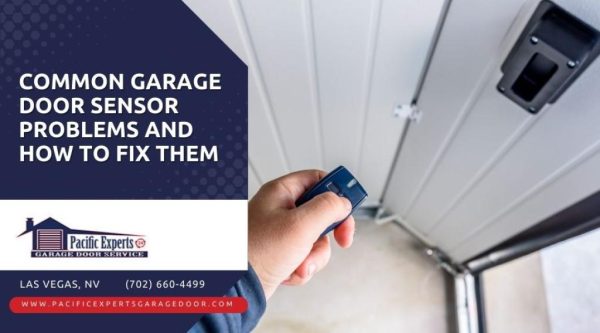Garage doors are an essential part of our homes, providing convenience and security. They rely on sensors to detect objects and ensure safe operation. However, like any electronic device, garage door sensors can experience problems over time. In this article, we will discuss common garage door sensor problems and provide step-by-step solutions to fix them.
Understanding Garage Door Sensors
Garage door sensors are essential components of your garage door system. They are designed to ensure safety by detecting objects or people in the path of the closing door, preventing accidents and damages. Typically, there are two sensors, one on each side of the door, that communicate with each other using an infrared beam. When the beam is interrupted, the sensors signal the door opener to stop closing. Understanding how these sensors work is crucial for troubleshooting common problems.
Common Garage Door Sensor Problems
Despite their importance, garage door sensors can experience various issues that can affect their functionality. Here are some common problems you may encounter:
- Misalignment: Over time, sensors can become misaligned due to accidental bumps or vibrations. When misalignment occurs, the infrared beam may not reach the opposing sensor, leading to malfunctions.
- Dirty lenses: Dust, dirt, or spiderwebs on the sensor lenses can obstruct the infrared beam. This obstruction can prevent the sensors from working correctly, causing the door to either not close or reverse unexpectedly.
- Faulty wiring: Damaged or frayed wires can disrupt the electrical connection between the sensors and the door opener. This issue can result in the sensors not functioning properly.
- Sensor sensitivity issues: Garage door sensors usually have a sensitivity adjustment feature. If the sensitivity is set too high or too low, it can cause the door to behave erratically. For instance, it might reverse when there is no obstruction or failure to close fully.
Fixing a Garage Door Sensor
Before attempting any repairs, ensure that the power to the garage door opener is disconnected to avoid any accidents. Here's how you can fix common garage door sensor problems:
- Realign the sensors: Check the alignment of the sensors by inspecting their positions. They should be facing each other directly and their lenses must be clean. If they are misaligned, gently adjust them until the indicator lights on both sensors are lit up.
- Clean the lenses: Use a soft, lint-free cloth to clean the lenses of the sensors. Remove any dirt, dust, or spiderwebs that might be obstructing the infrared beam. After cleaning, test the door to see if the issue has been resolved.
- Check the wiring: Examine the wires connecting the sensors to the door opener. Look for any signs of damage or loose connections. If you find any issues, repair or replace the wiring as necessary.
- Adjust the sensitivity: Consult your garage door opener's manual to locate the sensitivity adjustment feature. Follow the instructions to adjust the sensitivity according to the manufacturer's recommendations. Test the door's operation after adjusting.
When to Call a Professional
While many garage door sensor problems can be resolved through DIY troubleshooting and repairs, there are instances when it's best to seek professional help. Consider calling a garage door technician if:
- You are unsure about the issue: If you're not confident in your ability to diagnose or fix the problem, it's better to let an experienced professional handle it. They have the knowledge and expertise to identify and resolve complex sensor issues.
- Repairs involve complex wiring: Dealing with electrical components can be dangerous if you don't have the necessary skills. If you suspect that the problem lies within the wiring or electrical connections, it's safer to let a professional handle the repair work.
- DIY attempts are unsuccessful: If you've followed the troubleshooting steps and attempted repairs but the sensor problem persists, it's time to call in a professional. They can perform a thorough inspection and provide a reliable solution.
Preventive Maintenance Tips
To minimize the occurrence of garage door sensor problems, consider implementing these preventive maintenance tips:
- Regular cleaning: Clean the sensor lenses periodically to remove any dust, dirt, or debris. Use a soft cloth or a gentle cleaner to wipe the lenses and ensure they are free from obstructions.
- Visual inspection: Conduct visual inspections of the sensors and their surrounding areas. Look for any signs of damage, misalignment, or loose wiring. Address any issues promptly to prevent further complications.
- Test the sensors: Regularly test the functionality of the sensors by intentionally obstructing the infrared beam while the door is closing. Ensure that the door reverses or stops immediately upon obstruction. If the sensors do not respond correctly, further troubleshooting may be required.
- Check the sensor mounting: Ensure that the sensors are securely mounted and aligned properly. Vibrations or movements over time can cause them to become loose. Make sure the sensors are firmly attached to their designated positions.
- Maintain a clear path: Keep the area around the sensors clear of any objects, debris, or storage items. A clear path will allow the sensors to detect any obstructions accurately.
- Lubrication: Apply lubrication to the moving parts of the garage door system, including the hinges, rollers, and tracks. This helps to reduce friction and ensures smooth operation, which indirectly contributes to the proper functioning of the sensors.
- Read the manufacturer's manual: Familiarize yourself with the specific maintenance guidelines provided by the manufacturer of your garage door opener and sensors. Follow their recommendations for maintenance and servicing.
Conclusion
Garage door sensors are crucial safety components that play a significant role in preventing accidents and damage. Understanding common sensor problems and knowing how to troubleshoot them can save you time and money. By regularly maintaining and inspecting your sensors, you can ensure their optimal performance and enjoy a safe and functional garage door system.
FAQs about Garage Door Sensor Problems
Why is it important to fix garage door sensor problems promptly?
Garage door sensors are responsible for detecting obstructions and preventing accidents. Ignoring sensor problems can compromise the safety of your garage door system and increase the risk of accidents or property damage.
Can I bypass or disable garage door sensors?
Bypassing or disabling garage door sensors is strongly discouraged. These safety features are designed to protect you and your belongings. Tampering with them can compromise the safety of your garage door system.
How often should I clean my garage door sensors?
It is recommended to clean the sensor lenses every few months or whenever you notice dirt or obstructions. Regular cleaning helps ensure the sensors work optimally.
Why is professional help recommended for some garage door sensor issues?
Some sensor issues may require specialized knowledge and equipment to diagnose and repair. Professional technicians have the expertise to handle complex sensor problems and ensure proper functionality.
Can extreme temperatures affect garage door sensor performance?
Yes, extreme temperatures can impact sensor performance. Very hot or cold temperatures may cause the sensors to malfunction. If you experience sensor issues during extreme weather conditions, consult a professional for assistance.
Remember to consult with a professional or refer to your garage door opener's manufacturer manual for specific guidance and instructions when dealing with sensor problems or repairs. Proper maintenance and timely troubleshooting will help keep your garage door sensors in excellent working condition.






